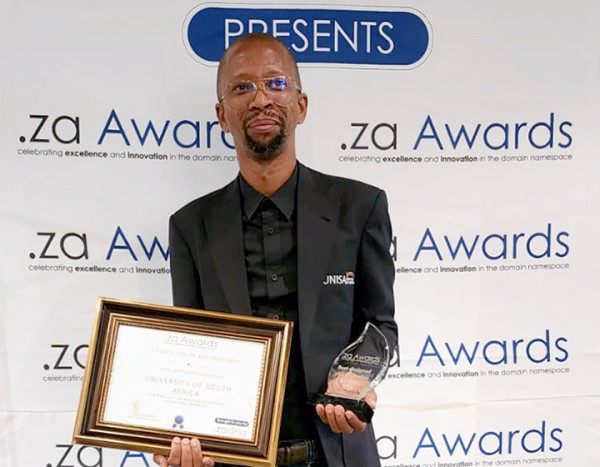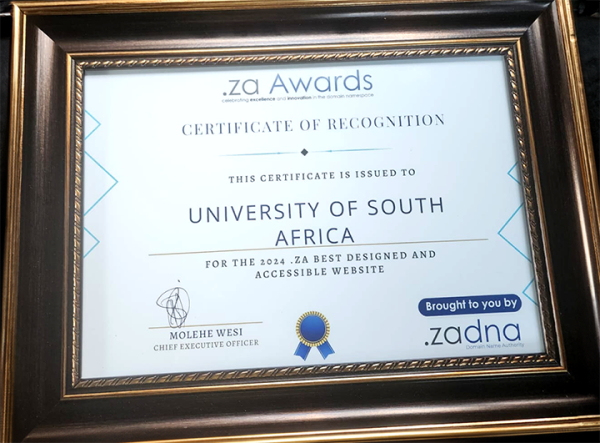News & Media
Unisa website crowned best of the best in South Africa
On 4 December 2024, Unisa won the Best Designed and Accessible Website Award at the 2024 .za Awards, held in Sandton, for its corporate website (www.unisa.ac.za). This annual event, hosted by the .za Domain Name Authority (.zadna), recognises the contributions of individuals and organisations to the growth of the internet in South Africa.
.zadna is a not-for-profit organisation that manages and regulates the .za namespace in its entirety.

Prof Boitumelo Senokoane, Acting Executive Director: Department of Institutional Advancement, received the award on behalf of the university
This prestigious recognition celebrates excellence and innovation in website design and accessibility. Unisa was nominated alongside First National Bank (FNB) and the South African Social Security Agency (Sassa) in the top three.
The event featured professionals and industry stakeholders who met to discuss recent trends in domain name marketplaces, and opportunities for competitive growth in the South African domain name market.
To be considered in this category, websites had to
- have a simple, straightforward navigation layout with a logical hierarchy and a search function.
- be responsive to different screen sizes and devices.
- minimise page load times by compressing pictures and optimising code.
- adhere to the Web Content Accessibility Guidelines (WCAG) to provide accessibility for those with disabilities.
Unisa’s website met these benchmarks with flying colours.

za Awards Certificate of Recognition
Prof Boitumelo Senokoane, Acting Executive Director: Department of Institutional Advancement, proudly received the award on behalf of Unisa. Senokoane expressed excitement about this achievement, stating that it highlights Unisa’s commitment to providing a platform that prioritises inclusivity, provides exceptional user experience and features cutting-edge digital design.
Senokoane proceeded to congratulate the steadfast team who dutifully work to keep the website seamless, user-friendly and adhering to modern practices, adding: "Thank you to everyone who contributed to this success."
Through this award, the university continues to demonstrate excellence and innovation in its forward-thinking approach towards top-tier online learning as a prestigious open, distance and eLearning (ODeL) institution.
* By Godfrey Madibane, Acting Journalist, Department of Institutional Advancement
Publish date: 2024/12/05

 Unisa co-hosts G20 community outreach in the Eastern Cape
Unisa co-hosts G20 community outreach in the Eastern Cape
 Unisans gain membership of prestigious science academies
Unisans gain membership of prestigious science academies
 Advocating for disability transformation through servant leadership
Advocating for disability transformation through servant leadership
 Unisa Press continues to illuminate the publishing space
Unisa Press continues to illuminate the publishing space